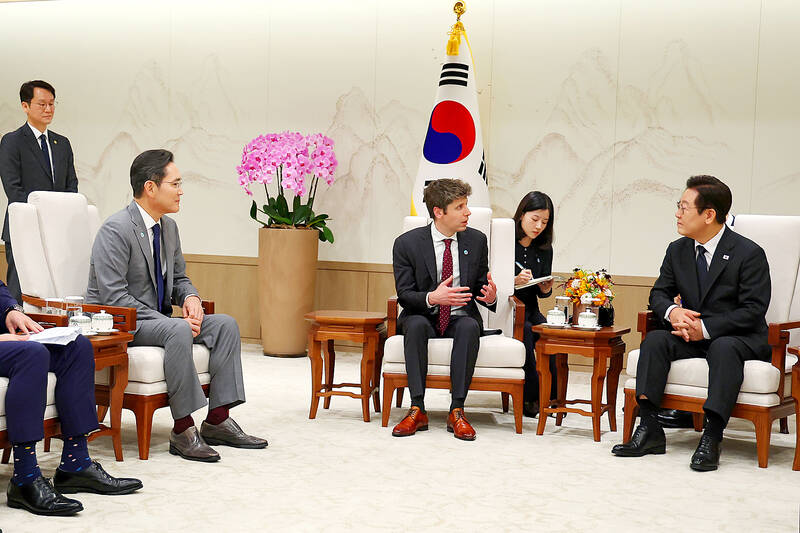Samsung Electronics Co and SK Hynix Co have forged initial agreements to supply chips and other gear to OpenAI’s Stargate project, a deal that helps shore up their lead in advanced memory chips for artificial intelligence (AI).
OpenAI chief executive officer Sam Altman yesterday signed a letter of intent to enlist South Korea’s two biggest companies in the data center construction effort, which involves the biggest players in AI from Nvidia Corp to Oracle Corp. Overall demand from OpenAI could reach 900,000 wafers per month as Stargate expands across the globe, the South Korean companies said in separate statements.
That projection for demand is more than double the current global capacity for high-bandwidth memory (HBM), underscoring Stargate’s enormity and quickening global AI development, SK Hynix said in its statement.

Photo: EPA
OpenAI and Nvidia are helping lead a global push to build data centers for a new generation of AI tools — an effort that is expected to cost trillions of dollars and require chips, servers, cooling systems and copious amounts of electricity. Altman was due in Taipei next, where he is slated to meet with AI linchpins Taiwan Semiconductor Manufacturing Co (台積電) and Hon Hai Precision Industry Co (鴻海精密), local media reported.
The pact signed in Seoul is aimed at creating a longer-term partnership between the US’ most valuable AI start-up and two Asian companies that, along with Micron Technology Inc, dominate the memorychip sphere. As part of the agreement, the partners would help Seoul develop a domestic AI ecosystem — something many governments are exploring to try and harness a potentially transformative technology.
“I hope that Samsung and SK will play a key role in the global spread of AI together with OpenAI,” South Korean President Lee Jae-myung said in the statement.
Last month, Nvidia announced it would invest as much as US$100 billion in OpenAI to support new data centers and other infrastructure, a blockbuster deal that underscores booming demand for services such as ChatGPT and the computing power needed to make them run.
SK Hynix is the global leader in the provision of HBM essential to Nvidia’s AI accelerators, but Samsung is vying to become a major supplier as well.

Sweeping policy changes under US Secretary of Health and Human Services Robert F. Kennedy Jr are having a chilling effect on vaccine makers as anti-vaccine rhetoric has turned into concrete changes in inoculation schedules and recommendations, investors and executives said. The administration of US President Donald Trump has in the past year upended vaccine recommendations, with the country last month ending its longstanding guidance that all children receive inoculations against flu, hepatitis A and other diseases. The unprecedented changes have led to diminished vaccine usage, hurt the investment case for some biotechs, and created a drag that would likely dent revenues and

Global semiconductor stocks advanced yesterday, as comments by Nvidia Corp chief executive officer Jensen Huang (黃仁勳) at Davos, Switzerland, helped reinforce investor enthusiasm for artificial intelligence (AI). Samsung Electronics Co gained as much as 5 percent to an all-time high, helping drive South Korea’s benchmark KOSPI above 5,000 for the first time. That came after the Philadelphia Semiconductor Index rose more than 3 percent to a fresh record on Wednesday, with a boost from Nvidia. The gains came amid broad risk-on trade after US President Donald Trump withdrew his threat of tariffs on some European nations over backing for Greenland. Huang further

Macronix International Co (旺宏), the world’s biggest NOR flash memory supplier, yesterday said it would spend NT$22 billion (US$699.1 million) on capacity expansion this year to increase its production of mid-to-low-density memory chips as the world’s major memorychip suppliers are phasing out the market. The company said its planned capital expenditures are about 11 times higher than the NT$1.8 billion it spent on new facilities and equipment last year. A majority of this year’s outlay would be allocated to step up capacity of multi-level cell (MLC) NAND flash memory chips, which are used in embedded multimedia cards (eMMC), a managed

CULPRITS: Factors that affected the slip included falling global crude oil prices, wait-and-see consumer attitudes due to US tariffs and a different Lunar New Year holiday schedule Taiwan’s retail sales ended a nine-year growth streak last year, slipping 0.2 percent from a year earlier as uncertainty over US tariff policies affected demand for durable goods, data released on Friday by the Ministry of Economic Affairs showed. Last year’s retail sales totaled NT$4.84 trillion (US$153.27 billion), down about NT$9.5 billion, or 0.2 percent, from 2024. Despite the decline, the figure was still the second-highest annual sales total on record. Ministry statistics department deputy head Chen Yu-fang (陳玉芳) said sales of cars, motorcycles and related products, which accounted for 17.4 percent of total retail rales last year, fell NT$68.1 billion, or